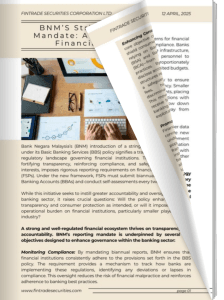Bank Negara Malaysia’s (BNM) introduction of a stringent reporting mandate under its Basic Banking Services (BBS) policy signifies a transformative shift in the regulatory landscape governing financial institutions. This policy, aimed at fortifying transparency, reinforcing compliance, and safeguarding consumer interests, imposes rigorous reporting requirements on financial service providers (FSPs). Under the new framework, FSPs must submit biannual reports on Basic Banking Accounts (BBAs) and conduct self-assessments every two years.
While this initiative seeks to instill greater accountability and oversight within the banking sector, it raises crucial questions: Will the policy enhance banking transparency and consumer protection as intended, or will it impose an undue operational burden on financial institutions, particularly smaller players in the industry?
A strong and well-regulated financial ecosystem thrives on transparency and accountability. BNM’s reporting mandate is underpinned by several key objectives designed to enhance governance within the banking sector:
Monitoring Compliance: By mandating biannual reports, BNM ensures that financial institutions consistently adhere to the provisions set forth in the BBS policy. The requirement provides a mechanism to track how banks are implementing these regulations, identifying any deviations or lapses in compliance. This oversight reduces the risk of financial malpractice and reinforces adherence to banking best practices.
Enhancing Consumer Protection: A core objective of the mandate is to shield consumers—particularly those relying on Basic Savings Accounts (BSA) and Basic Current Accounts (BCA)—from unfair banking practices. By requiring banks to disclose account-related data and fee structures regularly, the policy acts as a safeguard against unauthorized fees, hidden charges, and discriminatory account restrictions. This move ensures that consumers receive fair and equitable access to banking services without exploitation.
Promoting Financial Inclusion: Financial inclusion remains a critical concern, especially for Malaysia’s underbanked and unbanked populations. The new reporting framework compels financial institutions to ensure that essential banking services remain accessible to all segments of society, including low-income groups, rural communities, and marginalized individuals. This aligns with Malaysia’s broader financial inclusion agenda and facilitates greater economic participation.
Facilitating Policy Refinement: Policy adjustments driven by data are vital for the evolution of a dynamic banking ecosystem. By systematically analyzing the insights derived from biannual reports and biennial self-assessments, BNM can identify gaps in the existing regulatory framework and introduce necessary reforms. This iterative approach allows for responsive governance, where policies are refined in line with emerging financial trends and consumer needs.
IMPACT ON FINANCIAL INSTITUTIONS
While the objectives of the mandate are commendable, its implementation presents both opportunities and challenges for financial institutions. Some of the advantages include:
Improved Governance: A structured reporting framework fosters robust internal monitoring mechanisms within financial institutions. Banks are compelled to enhance their compliance practices, mitigate risks proactively, and ensure alignment with regulatory expectations. This, in turn, strengthens corporate governance and bolsters institutional credibility.
Standardization of Banking Practices: Uniform reporting structures ensure that all financial institutions adhere to standardized regulatory norms. This creates a level playing field where industry-wide best practices are followed, reducing inconsistencies in banking operations and service delivery.
Enhanced Consumer Trust and Confidence: Consumers tend to place greater trust in financial institutions that operate with transparency and regulatory oversight. The introduction of structured reporting mechanisms reassures customers that their banking partners are subject to stringent supervision, thereby improving confidence in the financial system.
And, the challenges can be summarised as:
Escalating Operational Costs: One of the most pressing concerns for financial institutions is the increased financial burden associated with compliance. Banks must allocate substantial resources to upgrade their compliance infrastructure, invest in data management systems, and employ dedicated personnel to oversee regulatory reporting. These added expenses could disproportionately impact smaller banks and financial cooperatives that operate on limited budgets.
Risk of Overregulation: While regulatory oversight is necessary to ensure financial stability, excessive bureaucratic procedures can stifle efficiency. Smaller banks may struggle to comply with the intricate reporting requirements, placing them at a competitive disadvantage against larger financial institutions with more robust compliance frameworks. Overregulation could also slow down innovation within the banking sector by diverting resources away from customer-centric improvements.
Data Privacy and Cybersecurity Risks: Given the vast amount of customer data that financial institutions must collect, process, and submit under the new mandate, data security emerges as a significant concern. Banks must implement stringent cybersecurity measures to safeguard sensitive customer information from potential breaches, cyberattacks, and data leaks. Ensuring compliance with data protection laws while meeting BNM’s reporting obligations adds another layer of complexity to financial institutions’ regulatory responsibilities.
Looking ahead, BNM’s stringent reporting mandate is a double-edged sword. On the one hand, it strengthens banking transparency, promotes accountability, and enhances consumer protection. On the other hand, it places additional financial and operational strain on financial institutions, particularly smaller players in the industry.
For the policy to be successful, a balanced approach is essential. Regulators must engage with stakeholders—both large and small financial institutions—to refine reporting guidelines and minimize compliance burdens without compromising transparency. Additionally, leveraging technology and automation in regulatory reporting could streamline compliance efforts, reducing the administrative strain on financial institutions.
Ultimately, the success of the mandate will depend on how effectively it achieves its objectives without unduly hindering the operational efficiency of Malaysia’s banking sector. The next few years will be pivotal in assessing whether this policy shift truly fosters a more transparent and inclusive financial system or whether it inadvertently creates new challenges that require further regulatory intervention.
A BOON OR A BURDEN
Bank Negara Malaysia (BNM) has taken a decisive step in strengthening the regulatory landscape by implementing a stringent reporting mandate under its Basic Banking Services (BBS) policy. This regulatory overhaul requires financial service providers (FSPs) to submit biannual reports on Basic Banking Accounts (BBA) and conduct biennial self-assessments, ensuring that banks comply with established guidelines.
While this initiative is positioned as a measure to enhance transparency, compliance, and consumer protection, a critical question remains: Will this reporting mandate truly foster banking transparency, or will it impose undue operational burdens on financial institutions?
A well-regulated financial system thrives on transparency, accountability, and consumer protection. BNM’s latest policy intervention seeks to fortify these pillars by ensuring stringent monitoring, equitable banking practices, and enhanced financial inclusion. The key objectives behind this policy shift include:
Strengthening Compliance Oversight: By mandating biannual reporting, BNM aims to closely monitor financial institutions’ adherence to the BBS policy. This reporting mechanism helps regulators detect policy deviations, non-compliance issues, and potential unfair banking practices, ensuring that banks do not circumvent regulatory norms to the detriment of consumers.
Enhancing Consumer Protection: The Basic Savings Account (BSA) and Basic Current Account (BCA) serve as critical financial instruments for many consumers, particularly those from economically vulnerable backgrounds. The reporting mandate prevents banks from levying hidden charges, imposing unfair restrictions, or engaging in discriminatory practices. By demanding transparency, the policy safeguards consumer interests and ensures unhindered access to essential banking services.
Promoting Financial Inclusion: BNM’s regulatory push aligns with its broader agenda of financial inclusion. Many low-income individuals, small business owners, and rural populations rely on basic banking services. By ensuring compliance with BBS policies, the reporting mandate reinforces accessibility, making banking services affordable and widely available.
One of the long-term benefits of systematic data collection is the ability to fine-tune financial policies. The reports submitted by banks will provide BNM with critical insights into the effectiveness of the BBS policy, challenges faced by financial institutions in implementation, and potential areas of improvement in regulatory frameworks.
This data-driven approach allows policymakers to introduce corrective measures, bridge regulatory gaps, and respond to emerging financial trends proactively.
While the mandate serves an essential regulatory and consumer-centric function, it presents both opportunities and challenges for financial institutions. Some of the advantages of the Reporting Mandate include:
Strengthened Corporate Governance: A structured and periodic reporting framework forces banks to enhance their internal governance structures. By tracking compliance gaps, institutions can identify operational inefficiencies, streamline reporting mechanisms, and mitigate financial risks proactively.
Standardized Banking Practices: A uniform reporting mandate ensures that all financial institutions operate under the same regulatory framework, preventing disparities in service offerings. This creates a level playing field, particularly for smaller financial institutions, ensuring that they do not engage in practices that put them at a disadvantage compared to larger banks.
Increased Consumer Confidence: In an era where financial transparency is paramount, stringent regulatory oversight reassures customers that their financial service providers are held accountable. A robust compliance mechanism fosters consumer trust, leading to greater customer retention, increased confidence in basic banking services, and a stronger financial ecosystem.
CHALLENGES AND POTENTIAL DRAWBACKS
The implementation of a stringent reporting system comes with significant operational costs. Banks will need to invest in advanced data management systems, specialized compliance teams, and enhanced reporting infrastructure to meet BNM’s mandates. For smaller financial institutions with limited resources, these compliance costs may be disproportionately burdensome, affecting their profitability and operational efficiency.
While regulation is necessary, excessive bureaucratic procedures can sometimes stifle innovation and create administrative inefficiencies. Overregulation could lead to slower decision-making processes, reduced operational flexibility, and a competitive disadvantage for smaller banks. Additionally, the risk of penalties and enforcement actions for non-compliance may discourage smaller institutions from expanding services in fear of regulatory repercussions.
With an increased emphasis on financial data collection, banks will need to ensure the highest levels of cybersecurity. The risk of data breaches, unauthorized access to sensitive financial information, and regulatory challenges concerning data protection could emerge as major hurdles. Banks will need to enhance cybersecurity protocols, implement stronger encryption methods, and invest in advanced risk management strategies to mitigate these risks.
BNM’s reporting mandate under the Basic Banking Services (BBS) policy undoubtedly strengthens compliance mechanisms, enhances consumer protection, and promotes financial inclusion. However, its effectiveness will ultimately depend on how financial institutions adapt to these regulatory demands.
A well-balanced approach is essential, one that ensures:
– Regulators enforce transparency without stifling banking operations,
– Financial institutions have the flexibility to innovate while remaining compliant, and
– Consumer protection remains at the heart of the policy without overburdening banks.
Moving forward, BNM must engage with stakeholders, review the practical implications of the mandate, and introduce necessary adjustments to strike a balance between regulatory stringency and operational feasibility. Only then can this policy truly serve its intended purpose without becoming a counterproductive regulatory hurdle.
In a significant move toward strengthening financial governance, Bank Negara Malaysia (BNM) has introduced a new reporting mandate aimed at enhancing transparency and fostering greater financial inclusion. This policy is not just a regulatory shift; it represents a bold commitment to ensuring that banking services remain fair, accessible, and accountable to all Malaysians.
While the mandate brings with it inevitable implementation challenges—ranging from compliance complexities for financial institutions to the need for robust digital infrastructure—the long-term benefits far outweigh these initial hurdles. By enforcing stricter reporting standards, BNM is fortifying consumer protection mechanisms, mitigating financial risks, and laying the groundwork for a more resilient and stable market.
A key aspect of this initiative is its potential to bridge financial gaps, especially for underserved communities. Increased transparency in reporting will not only improve regulatory oversight but also create an environment where financial institutions are incentivized to offer more inclusive and equitable services. Small businesses, low-income groups, and first-time borrowers stand to benefit immensely from a system that prioritizes fair lending practices and eliminates opaque financial dealings.
Malaysia has the unique opportunity to learn from global financial models that have successfully navigated similar transitions. Countries like Singapore and the UK have demonstrated how stringent financial reporting, when executed with strategic foresight, can boost investor confidence, strengthen economic resilience, and promote responsible banking practices. By studying these global examples and proactively addressing potential bottlenecks—such as regulatory burden, cybersecurity concerns, and technological adaptation—Malaysia can set a gold standard in financial transparency.
Ultimately, BNM’s new reporting mandate is more than a regulatory reform—it is a transformative step towards a financial ecosystem that prioritizes trust, accountability, and inclusivity. By embracing this change and refining its execution through global best practices, Malaysia can not only safeguard its financial sector but also emerge as a leader in transparent and consumer-centric banking.


